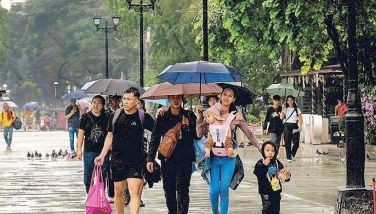Gov't to appeal ruling on Alabang Boys
MANILA, Philippines - State prosecutors will appeal the acquittal by the Muntinlupa Regional Trial Court of two of the three drug suspects known as the “Alabang boys” who were arrested by agents of the Philippine Drug Enforcement Agency (PDEA) in Ayala Alabang Village in 2008.
Justice Secretary Leila de Lima said yesterday she had instructed prosecutors handling the case to file a motion for reconsideration before Muntinlupa RTC Branch 208 Judge Juanita Guerrero, who acquitted Richard Brodett and Jorge Joseph of drug trafficking charges.
“It seems that the judge committed a mistake in her decision. There is some gross misappreciation of procedure, especially in terms of supposed broken chain of custody of evidence,” she explained.
De Lima said the prosecution would challenge the application of the rule on double jeopardy, which prohibits indictment of accused already acquitted by thecourt for the same offense, in this case.
She argued that misappreciation of the court of applicable procedures under the law is an exemption to this rule.
The DOJ chief said they would also question how the court made a complete turnaround in its findings on the handling of the evidence seized by PDEA agents from Brodett and Joseph.
Brodett is a resident of Ayala Alabang Village, while Joseph is the son of radio personality Johnny Midnight.
They were arrested for allegedly selling 60 pieces of Ecstasy tablets worth P750 each to an undercover PDEA agent.
Several grams of cocaine and dried marijuana leaves were also recovered inside the car of Brodett.
With the acquittal of Joseph and Brodett, the only remaining member of the Alabang boys still with a pending case is Richard Tecson.
Tecson’s drug trafficking case is still pending at the Quezon City Regional Trial Court Branch 227, according to lawyer Alvaro Lazaro, head of PDEA’s Legal Service.
Lazaro said the prosecution is still presenting its evidence against Tecson before the court.
Tecson was arrested in Quezon City the same day Brodett and Joseph were nabbed in Ayala Alabang.
De Lima cited an earlier ruling by Judge Guerrero junking the motion to post bail filed by the accused, after the judge even found “the
evidence as strong to warrant the conviction of accused.”
“To warrant a conviction, it’s practically saying already the guilt is beyond reasonable doubt,” she stressed.
De Lima also wondered why the court deleted in its acquittal decision a portion of its earlier ruling on the bail motion: “All the links in the custody of the drug evidence were presented to prove with absolute certainty that the confiscated drugs are the same batch of Ecstasy turned over to SOCO (police Scene of the Crime Operatives) as evidence custodian to the crime laboratory for examination by Rona Agullon and their identification in court.”
“So it says all the links were presented. And then why suddenly the court ruled that there is now missing link?” she asked.
She said this earlier ruling of the court was the reason why former PDEA chief Dionisio Santiago and Major Ferdinand Marcelino were no longer presented by the prosecution during the trial.
De Lima met Santiago and Marcelino in a meeting arranged by Volunteers Against Crime and Corruption founding chair Dante Jimenez.
The DOJ chief believes the RTC judge overly applied the rule on chain of custody of evidence when the Supreme Court (SC) itself in earlier rulings was not as strict on this rule.
“There is an SC decision which says it (chain in custody of evidence) is not really the most important thing. What’s more important is to prove there is tampering of evidence to question admissibility of evidence,” she argued.
De Lima said they hope the RTC would realize its mistake and reverse its decision, which could consequentially bring Brodett and Joseph back to jail.
Should the RTC stand by its decision, the DOJ chief vowed to elevate the case to the Court of Appeals.
This case had put the DOJ in the limelight after state prosecutors and top department officials were questioned for lapses and improprieties in handling the case.
The prosecutors were also accused of accepting bribe money allegedly for dismissing the charges before Christmas in 2008.
The controversy led to the issuance of Administrative Order 253 by the former administration in January 2009, directing the automatic review by the Office of the President of all decisions and resolutions involving the dismissal of drug cases.
After a fact-finding probe on the bribery charge, the Palace then reversed the findings of DOJ and ordered the filing of charges against the suspects.
- Latest
- Trending





























